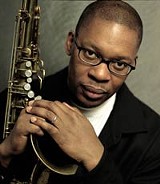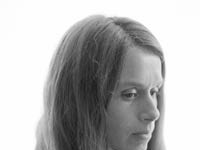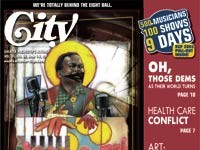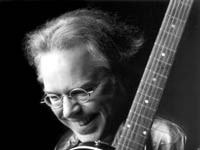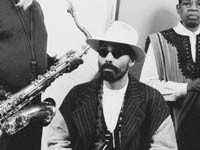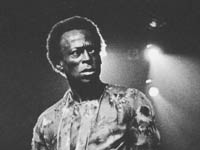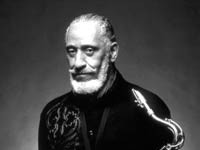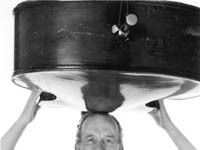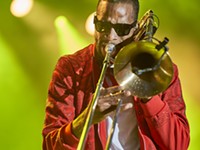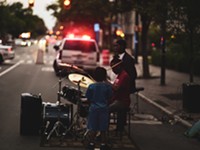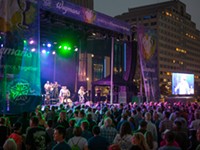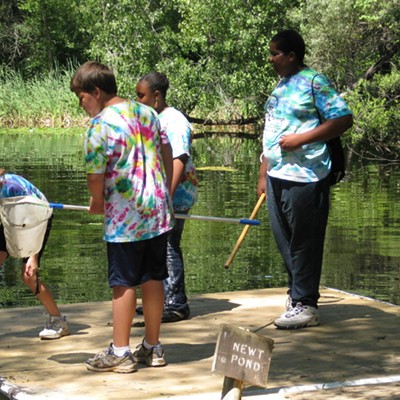[
{
"name": "500x250 Ad",
"insertPoint": "5",
"component": "15667920",
"parentWrapperClass": "",
"requiredCountToDisplay": "1"
}
]
Imagine being a saxophone player, leading a band on stage to play your tunes and improvise. The group might be cooking one night, out of synch the next. Your own playing might be inspired or lacking.
It would be challenging enough for any saxophonist, but maybe a bit tougher if your name is Ravi Coltrane.
Coltrane is the son of John Coltrane, who is widely regarded as the greatest jazz saxophonist who ever lived. His mother, pianist-harpist Alice Coltrane, is also a revered figure in jazz. But Coltrane has not let the towering stature of his parents inhibit his own musical journey; he's just taken it a bit slower than the music industry might have expected.
At the age of 40, he has put together a top-notch band and released In Flux, the best album of his career. It's only his fifth album as a leader, even though his career began 15 years ago. A look at Coltrane's discography reveals that he has appeared on 10 times as many albums as a sideman.
"Fundamentally, it's about the playing," says Coltrane by telephone from his Brooklyn home. "To say I want to be a leader and have my own band and put records out and be a star --- that's something else really. My interests start with the music. The other thing is secondary."
Although Coltrane was only two years old when his father died in 1967, he still feels the connection.
"As a musician and as a son who never knew his father --- of course," says Coltrane. But he downplays the link.
"It's interesting with me. I'm no different than 500,000 guys carrying saxophones around the world," he says. "We all hear the same music, we're turned on by all the same things and we try to do something. Somebody will hear something and say, 'Well, he sort of sounded like John Coltrane on this one, but he didn't really sound like him on this one.' You could do that with any serious improviser on a tenor saxophone."
Indeed, Coltrane's influences are wide-ranging, from his father to Sonny Rollins, Charlie Parker, Wayne Shorter, and Joe Henderson right up to contemporary musicians like Joe Lovano.
But Coltrane believes the most important thing is to find his own voice.
"We're all kind of, like my father said, dipping from the same reservoir. So, to me, it's about being honest, really; trying to connect to the things you believe in musically, not just saying, 'OK, I'm going to go into a Trane thing here, I'm going to go into a Sonny Rollins thing there.' That shit is boring, because that's not what they did.
"Why show our love for these players by doing something that is the exact opposite of what they did? They didn't try to emulate the players that came before them and they weren't concerned with being hip or flashy," he says. "They were playing their music."
Coltrane's favorite tune on In Flux is not one of his own; it's "Away," a ballad composed by his bassist, Drew Gress. It is indeed one of the highlights of the album, but Coltrane is clearly coming into his own as a composer, as evidenced by "Coincide," which he says was "a ditty sketched out the night before the session."
Coltrane has been surrounded by music all his life, but the urge to become a musician didn't fully develop until he was 20.
"It starts with love really," he says. "You find yourself in the gravity of something and it's pulling you toward it, and you kind of give in to it. I got older and jazz music suddenly became very, very important to me. I couldn't hear anything else."
Even though he has come into his own as a player, the process seems just as important to him as reaching his goals. All of his collaborations over the years have been an important part of the journey.
"Working with [drummer] Elvin [Jones], of course was huge for me," he says. "Working with Steve Coleman sent me in a very specific direction, thinking about rhythm and stuff like that. Producing my mother's album kind of energized me. That taught me a lot."
Over the last several decades Alice Coltrane had been reclusive when it came to performing and recording. But Coltrane recently produced her critically acclaimed album Translinear Light.
Both his mother and father are known for their spirituality. Songs like "A Love Supreme" have affected people so deeply that there is even a Church of John Coltrane in San Francisco. (The family has no connection to it.) Alice Coltrane founded the Vedanta Center for Eastern Spiritual Study in 1975.
How has their spirituality affected Ravi Coltrane?
"It all seeps in," he says. "It's fundamentally a part of my whole experience, growing up, everything I saw and everything I was taught, whether or not I'm an active participant. My mother has gone to a place that is very disciplined and very strict. I've always been on the periphery. Most of us have. We sort of watched her and she involved us in different ways when we were younger. The belief system is still the same: that we have some higher things to kind of look up to and be guided by."
And Coltrane believes strongly in the power of music.
"It's language; it's just very, very beautiful abstract, universal language. It's about communicating and hopefully uplifting and inspiring people," he says. "When I heard that music that turned me on it just kind of pulled me in this direction."
And he has found that music can be a powerful force in people's lives.
"I meet people all the time who say, 'I was 19 years old and I was in trouble, going to jail, and doing this and then I heard this piece of music...' They'll usually reference something my father did: 'I heard "A Love Supreme" and it changed my life.' And they literally mean it. It's not just a cliché for a lot of people. It's like I was doing this, and now I got into this, I started going to school, I started teaching, I picked up an instrument and now this is where I am. The fact that somebody can alter the course of someone's life with sound --- it's kind of deep.
"We're all aware that this power exists within sound," Coltrane says. "It has a very strong effect on people. It would be great to always stay in touch with that aspect of the music. It's really about reaching out and healing and inspiring because all great music has that potential."
As for the music sitting in his CD player, Coltrane's been listening to another RIJF band leader, guitarist Derek Trucks.
"This guy's blowing me away," he says. "He's a real creative musician, a very forward-thinking guy. He's in his 20s, he's checking out all the jazz music and one of the first conversations we had, he wanted to talk about John Gilmore and Sun Ra and things you don't expect from a rock guitar player."
In the pop realm, Coltrane prefers Outkast. And he doesn't think music should be restricted by labels.
"It's hard for me to label anything because we're the products of generations and generations of great music, whether it be American or European or non-Western," he says. "It's 2005 and we're turned on by a lot of different things and that is going to affect what we do even as jazz improvisers. I like rock 'n' roll, or funk, or Indian music, but I play the saxophone and I improvise. It's going to affect what I do or what I write.
"So to me it's not so unusual to have these different elements within the context of one song or the context of a night at a club or the context of an album," Coltrane says. "It's easy for people to say it's not really jazz. I don't know what it is. People have this need to label things; I just want to say it's music. We all have different backgrounds and different tastes and different experiences but they somehow hopefully come out into one thing: some nice music."
The Ravi Coltrane Quartet plays at Kilbourn Hall, 26 Gibbs Street, on Sunday, June 12, at 6 and 10 p.m., as part of the Rochester International Jazz Festival. Free with Club Pass. $20 tickets available at the venue, space permitting. www.rochesterjazz.com
In This Guide...
Latest in Rochester International Jazz Festival
More by Ron Netsky
-
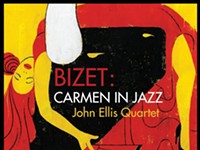
Album Review | 'Bizet: Carmen in Jazz'
Mar 26, 2024 -
'To Swing Is the Thing" by Mike Melito
Aug 10, 2023 - More »
